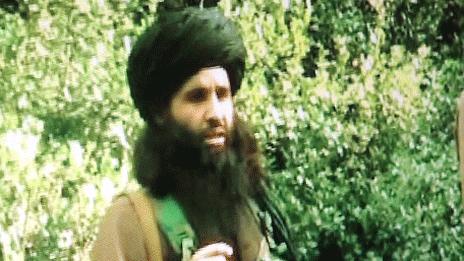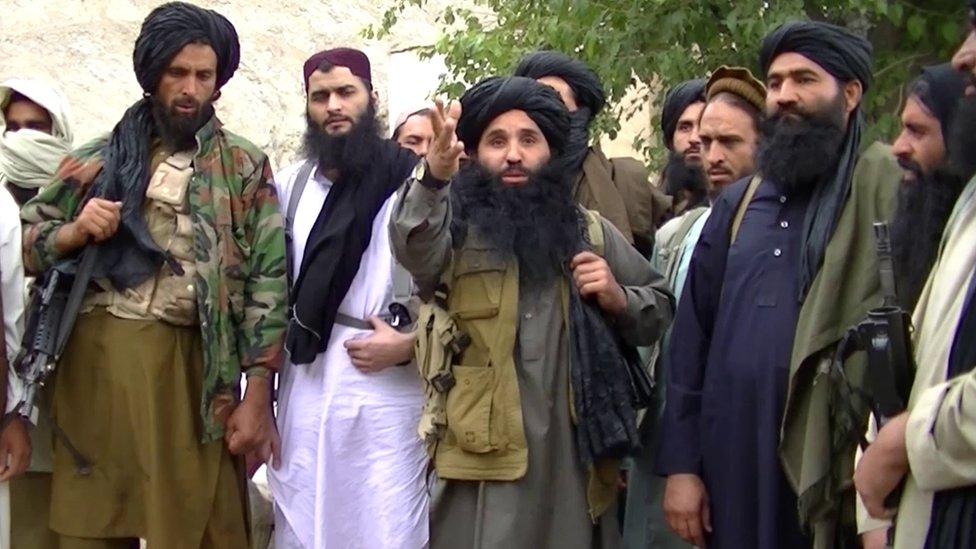Who is Pakistani Taliban leader Mullah Fazlullah?
- Published

A BBC correspondent, who met Fazlullah in 2009 in the Tirah Valley, was struck by his intensity
Mullah Fazlullah, the chief of the Pakistani Taliban, first came to prominence in the 2000s with his fiery radio tirades against the Pakistani government, education and the polio vaccine.
The 44-year-old is a passionate ideologue, a cleric implacably opposed to any rapprochement with the Pakistani state. He has appeared in numerous militant videos wielding knives and guns as soldiers are slaughtered in the background.
Fazlullah claimed ultimate responsibility for ordering the shooting of schoolgirl Malala Yousafzai in 2012 and also said he was behind the killing of high-ranking army officer Maj-Gen Sanaullah Niazi in September 2013.
Some US and Pakistani officials have also blamed Fazlullah for the Peshawar school attack in 2014, which killed 141 people in north-east Pakistan.
A BBC correspondent who met Fazlullah in 2009 in the Tirah Valley was struck by his intensity and his commitment to bringing Sharia law to Pakistan. Although a fighter, he viewed himself primarily as a scholar.
"He has a forceful personality, very serious and radical. He was friendly, but absolutely committed to communicating his cause," the correspondent reported.
Tall and powerfully-built, Fazlullah was surrounded by his fighters when our correspondent met him and clearly enjoyed interacting with the media.
But he was also highly respected by previous Taliban leaders Baitullah and Hakimullah Mehsud.
Analysts view him as even more ruthless than his predecessor, Hakimullah, who was killed in a US drone strike.
However, he clashed with his deputy Khalid Mehsud, who refused to accept his leadership of the Pakistani Taliban because he was not from the tribal region.
Radio mullah
When Fazlullah was picked as leader in 2013. it was the first time that the Pakistani Taliban had chosen someone to head their group who did not come from the country's volatile tribal belt - or from the Mehsud or Wazir tribes.
Fazlullah is the head of the Swat faction of the Taliban and grew up in the mountainous Swat valley in what is now Khyber Pakhtunkhwa province.

Mullah Fazlullah (centre) in a video released by the Pakistan Taliban
It was there as a young man that he became close to Maulana Sufi Mohammed, the founder of the militant group Tehrek-i-Nehfaz Shariat-i-Mohammedi (TNSM) which aims to enforce Sharia law in Pakistan.
It was this militant faction that spearheaded the Taliban uprising under Fazlullah in northern Pakistan. They were effectively in control of the scenic Swat valley from 2007 and in early 2009 they gained de facto control of the entire Malakand division until an army offensive ejected them in the summer.
Reports say Fazlullah got his first taste of frontline combat experience in 2001 when his mentor Maulana Sufi Mohammad took him along with thousands of others to Afghanistan to fight the Americans. On his return, Fazlullah was arrested and jailed for 17 months.
After his release and as militancy was on the rise in Pakistan, Mullah Fazlullah began daily sermons on illegal FM frequencies. He installed several dozen FM transmitters and used them to spread his message throughout the region - possibly the first cleric to put religion on radio.
These were hate speeches directed against the Americans, the Pakistani state, female education, the polio vaccine and promulgating the militants' extreme interpretation of Sharia law. Charismatic and lyrical, these broadcasts saw him gain followers in the region and earned him the moniker Mullah Radio.
Some, after listening to his sermons, threw their television sets out because he described them as "un-Islamic". Many Swatis grew beards because of his lectures.
Close to the Afghan Taliban
Fazlullah is thought to have hidden in Afghanistan after Pakistani military offensives against the Taliban.
Correspondents say that Fazlullah is extremely close to the Afghan Taliban and was always their preferred choice as the Taliban leader in Pakistan.
Analysts say they respect his credentials as a scholar and a cleric and believe that he is the most likely to act in concert with their interests.
Although the Afghan and Pakistani Taliban have their own domestic agendas, analysts say the Taliban in Afghanistan believed Mullah Fazlullah was the most likely of all the Pakistan candidates to accept the supremacy of Mullah Omar, the spiritual founder of the Afghan Taliban.
Fazlullah has been falsely reported killed numerous times - and has been known to telephone the media to personally deny reports of his death.
He reportedly narrowly avoided a US drone strike in November 2014 aiming to kill him.
In March 2018, the US added Fazlullah to its Rewards for Justice list, external, offering a reward of up to $5 million (£3.8m) for information that could help them hunt him down.